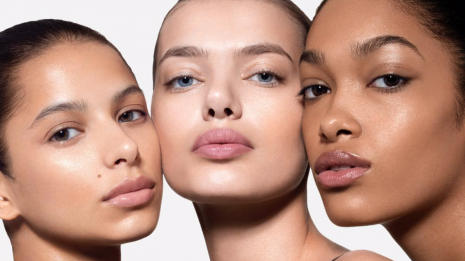CAPE TOWN, South Africa – Beauty group Estée Lauder is one of the most future-thinking brands, but its ability to tap into the black community across the world has allowed it to lean into the evolution and changes in the beauty world in regards to African women.
During a presentation at the Condé Nast International Luxury Conference on April 10, an Estée Lauder executive explained that black culture throughout the world offers a unique opportunity for influencer initiatives because the demographic has always leaned towards word-of-mouth communication. Throughout all of Estée Lauder’s brands, diversity is at the core, and all focus on creating prestige labels that are a part of all consumers’ dreams.
“We have a long standing focus on inclusive beauty because our aspiration is to be a part of every consumer’s beauty dream,” said Susan Akkad, senior vice president, local and cultural innovation at The Estée Lauder Companies. “Because we want to be a prestige company, we focus on the dream.
“We’re very excited about Africa and creating beauty dreams for the African woman.”
African beauty
As Africa becomes more important in the world of beauty, with urbanization and other factors growing the market’s consumer, Estée Lauder is hoping to build the dreams of African women.
The company believes that the region will have an important part in the future of beauty, as the fluidity between pop culture grows and natural ingredients become more popular.
In Africa, not only is the physical landscape itself extremely diverse, but so are the continent's cultures and consumers. While rapid organization is growing the middle class market, a significant portion of the continent is living in poverty with sparse infrastructure.
While Nigeria offers a large source of possible consumption, the region itself has much less infrastructure, posing a problem for brands who are looking to tap into the area. However, in South Africa, there is much more infrastructure but not quite as high buying power.
Beauty consumers in South Africa are more interested in enhancing their natural beauty and being their authentic selves, while those in Nigeria are focused on creating exaggerated new looks. The latter’s ideals are more aligned with black British, while the former is more congruent with black American.
Nigerian women are more interested in traveling abroad, while South Africans look to travel within the continent.
Since word-of-mouth marketing has always been an important part of black culture all over the world, the rise of influencers have become closely related to marketing to the demographic.
Estée Lauder offerings
The cosmetics company is focused on a positive business model that focuses on people instead of numbers.
Estée Lauder Companies centered a recent push in the fight against breast cancer on a significant statistic, looking to build a sense of urgency around the cause.
In honor of Breast Cancer Awareness Month, the company's brands joined forces on a campaign that spanned social media, out-of-home displays and in-store activations, telling consumers it is #TimeToEndBreastCancer. Rather than simply starting a conversation around the topic, Estée Lauder’s campaign aimed to inspire consumer actions towards eradicating the disease (see story).
The beauty maker also built the skills of its employees through a partnership with LinkedIn, offering an innovative way of learning.
Estée’s employees have been taking self-led classes since last March for the partnership’s soft open, according to a report from Women’s Wear Daily. Estée Lauder’s integration with LinkedIn Learning was revealed officially on Aug. 7, 2018 (see story).
"Hair in all of the global black cultures is by far the largest beautify category, but it’s the hardest to measure," Ms. Akkad said. "We generally talk about hair in the Estée Lauder companies not about ethnicities but abut texture.
"It’s about the structure of the hair in terms of our product development," she said.
{"ct":"6bSs71pGteEqZokdk8Gl+pdaLCr2aF5IHO4f5Q2MOCtcLAetTHWwvLApMSsDfDGs4HoRl2Yfu5yjbckAmw6y0+JeD1ApjbnuZy7O1WGyVR+3PyMGciEJtyj9ISu11dK31Y43JTz9nznY10AZ41\/7lV6q77WKVSHe0RwG10sClFGwIKdaydY7ji\/DsytWHXch1dKoV5La7n5ufk5f69VQHg6DmKM+BMIDt0RL+5Hz3umPM0oJ63NZ9gewQyXyZgtnIn\/Nc17z7ghvHbMNwjyjTl8RpquGnkHbNGETj+tbvocfbKKkWSg7Eeys1vr8ZYggaHhQFsf7AX+oxcUUsHjOrZg\/PREMI+PGRuHzn+SCgJ3xSCK6nYY0f\/+RN2TqCRWys3DmPZ7aU8nAjM2YekLn8g5ShOy67QpyWiGsDaCG4U66rJV\/T5kliuvQBrxy2dI3rcbywJLEZ9\/bbVcIFALWpp5WeijLSWN7QHiFvbJ3q2Xv1dTiybFxBZgw5mwTDwXKfK6txrxn8gaFw7EF9ktEHWewMVOn2MZt2QzFI\/LmxLJAXhIGuc7AbuiqTTgOiHZNN8\/PBDWOKr5Y\/uUJT6lFvaOWOP+nrBTfXA7CRL4KW41VzzHpombBZ3iyBzZDMCuDwo0rErb2h5Ee6KHQSkCvB99OMk9RHgCj\/sEV52PH4zpaVg9qREgVh5+IHJ580s6cNnM03wfFWoOSpuXtC5R54ykQMfZ3FVyHvYajfJe7vA6nEN3muhoi080jM6TugyG9UQsskpUp0RVSPic57sgQFsR+aoy8rIL4zUZXbkl8y7v71ZYOaB\/E9ZYiDV8T0xzFl1AzRzfpZyNnQpUQc7EUuS8znXjjMY3+2veJAb8Qmp9A0Ng2R98we50GgLmyGOeOAgRAFlHtBXxf9oKjLcVNIirFBEqWYLZ5wOTtjv0EoaGkM0M\/9v6YfZStSxpHSXTiaN8zYwAzHsuLAYX5hgT+lTGopB0jq8XeasUf6jJG9U60bRqtJoai39Mtboy7qOgx3fzt8NK8003MmSz27vVeYdMZgOXmSf1uwZtwQ68RPtbi+SAC2B63nEkfev+87BCB63WmLQ+tAsNlzZhYkNfLV9O2AKFWQFQj+rXWacwW9dufzAnqwsuyviricXtVmBiezgChL3N43H\/KMB0WvnL05s5h6SwtBQH82DOOGgp+0\/3Eayp6dFkJvdkQLiek9iGi15OEQYWWZb5ZPFm9D5PYzqlu0v+C63Glcl1ykRcliFj4+5oIBGQxu0kwQwtotvqEoudDW\/StvZeoCxEMo7LiZ8cI\/3wo6IBg69\/hUO+681DkoOAiRn+I2MTKTootDQMHY7vKbX1IvYOGI0+eyzRVFvsyPwF\/6yKo2AZYADFJ+vL000btVJGEfFCP9Tauj\/wEtg1awrsrNc4LVpJ1QUZ49YHLL0JGzWSvOCayutzEREG8rgiYuFgNcKGA8NoOUSAVH8SpQiTBAnXHn2+M+CrUu\/apu8NoOWmQ0JE14AfU7JP5MXNjwwlBzSrfDw1uA\/uRihTe\/46HrJQp53teAcd9\/9S\/tttYbzwbOxL\/zD8\/4wOHFpk5m7Nww6hueqRlFlo1jJTz9R3TRpQSRlPP4SAY7C40L+lk81c497g9ODZTXjt4lRVJB8fgotEEmFPGnuEwFb2AyCYhubgnk2AQDybXzfLh+ZxSrOTTu7o2jFcO6cEt+g00NYB+MlgaVLiyVxN0rbR9wZbjuY2f6wPAYm1BWBWDV+PtubSuYU2s3luVWn09K2PFZAeddh4570fJbS3E0a1QbR+gPNGlOJoo2wcaax\/H9CHXxuQBBRQVMjStiR3E4u6D0v67pRh7EngXx5ROrrKy5uymUqDMu8sCV5zb+\/NQw4WOqXJ1CDMiGbSBrpMK\/e\/Jw7GAqzzk8HXS78tHpYpMMXUolbnny8EQYQuW0Oeo707DlrE3NUs2NntvSZJA0SmOthorcDCmOLeKkE8Hteo\/cS7C7ycwVGQrc2gZvJ4NeGVIIxUcQsROFwCUzM\/nfr2+oNfA0rkf6hisR2cXCkLF7LGVJ1hR\/s8hUP1ywmfJz\/+saS3ynfaV3+AoSVprUMOs9SqtOb5jBbPaufHNPknXCSD0sfQI6uSCoa\/i1uJsfSrprUP5sn\/XYOT497h\/UaDJZ7LV8F\/XFlDIzXbp\/eNqOtf5Irb8FvcWsgTMkx\/NUo1mbeptaOz43QjXG5Dd2K4lUoJ5EB3lnqgs2Q5O7ArEk5redp9tYGbbMU1XU1hYNKjx1xBF48mdqlZCU6bLHvKUMdnbH+cVyvvOUlGmzbal84+wgcXKC7kZz4Tm7Yk85HBaE+gkYWkcNfDzqbhVgKvk70LREwUHL\/wIOwWC1yaj\/+3kTTiMwA8lxa9YvyaAlLgd24uTjBnPpyD9BUzT1dQN+b0K54Ev+eHF7wuKoSlw9nv2g\/LB1kJyRVCWcieUhjuCbdHjJC2tG\/3B75f2fuLfTGVzge6O7J\/dXUKm5y6I28CAx472TAPagdzds58+zqdef\/TDkhbRJymgPI33tj7Db0x+sJdXd2VPTdnW1YkteERlvF6NwambGzRnTqPIpwglJWry\/lN60XY7tZfdGDAHgX1Avf0\/vaU\/NoAJi9X4HJyupFz5JRt6QRAvluGQTOnnY4KiYr+V2jkPG\/AlqTWUZdbXSTjId+E1+dWldOabCUKoUkac\/IOpUqST95mNhZ\/KCbEFdNZwkjlfJBYev5tUOFcKm\/BW87PnuKnfuafT1zce18GbtkCB4GhCQe2h05N8uHk03PPobI75T9k0lO9Db4KGXJmrPHN0gzl70zF43STVMuYzhJ5G2WwgpVFr+dS0mVmFxsgjw4EFxSpDDpuduCV2JTa1F7ZIXE0LlDdyhqx5UmIeA0PuASEaUiPWnFjeTdVPhVIpgTtQSEDAvhaCZAo5aGpsAGCoelW88zZDVb4bwqlCtuldz+mw3ETIBW\/bYol4nYFR\/SOzS2bzQUgXeCZme0q4D8fIu+Z+e7WqP3IyqdjVYWAr+ZVyZ\/+ASjGDhKqWmZF8iTqJCnGLXFn5pLOnuV0EzYsDS7UBuouuGKEVIa6KXn7swTCdUPmq3O0y94qXeIapZKRGqWnoBt+RLomjb6tlSN1Cjz\/UQWgIHefKz\/ABxc\/RqVaQ82ezZjJow\/OYUEQRfgCx0GyQETuCi7BHmrLlw0lKeJ7jY\/mrTB77k96wfUkfd3wtEDr8A7rYHHe0EY2KgZtrjFfJpcqDmc7aD6S6+zWxg1HkkLc568z\/D+oFGOdLrutj24BmwRv3ltoiFgS\/S3t2PeiP4RmOOI07EOZmMFmGN1W4vag2HZiE6YVE099iiEzSDrQ3NIWMSDAJrMUExP+3brA5LOqcHhWLx2mBulvbLL0E6M+9HrAcNykZga1qZjvZBhZZZd3Vlk+uFFZ6cr0SxYj8SPneh7r88R77MdAFxDDLE3pIq2Y4671GDxXlZfLDVlNY4IcgJsF1s4ewh1PP3dPphZ8MQuT3QGKrXslPSfJh1XW0zWgNpAMJWrJIiq461CuwC6gUxc9BsnWotyvA+nep+03gUf6COOG+XA9cfIoxjxEN\/bxtpVc1z9RMBq2yrAUYsj18jcsoSh5C\/rXOuv4zXQbYn8+Hn64OPGRvFLH7kLL4aItaQWZQxhOaiMESwLOVe09BjVnLZJccm3BGtSM\/MJjcEzEQIA9cTpKCqX1Wo8Bynr7uHl38w6L6qJ4M2cJidZlNO0i4H6xFyym828ot5N5iZZT69ZaZhM+uiyRYUDllBvZQm8Mxeq5C\/+JjtgxYm4wvzc79NUMZNQFBAdIsukjCFW9sP3nZ2LbIXfhT102N22OIj5D1s0Ms6OigFumEV8v2he4T9FcF+7YqF+kG3JE26XzvSyP29FjT9Yamr17QG1xBto1PgcRhLRAblK+BPLyK\/VSD8qCjz\/RHEbJ4JjfNn1\/gVwbild8XvA4a4aa8awy5eW+udytN55nb1gzx2e7SN6TqdHoYhBankYejcgqKFKNMS1LQzQBwHwaey6tDGRozSA3wwgb5dsYSx\/fYrdjmIvXRbw6PMKi00TcSBIXXUh98rTqn0Z2L7nhHHLxzF\/uG9VtWHPjTxOA9NoqmJI+fFdnrsAWAi04LmKpi8vHSCOLv\/O2yYODQNXnkGeps+dcYj7vG21erttcjeoi0AQBqsVsbnVuZiNG9TIc9xR1qbw\/2UgScbAchOjPmaQ44I6cKhOXgvV4yZhVWdEckUp4H\/BKe7+mVadMnHwCsltl6r3gLopb9jWJSEvb\/rxP0afm+q5zTjOJPpwN5k7OxM8EqVSeEwjWKiIVPQfM2FRdHl5g7rwFno2lu4lTtSEUkg1a5i+q5Ojs9BLLcIdJv96qahaLn9DZwFSPmrBKoRiXNzJmcsLSkXLx2uF84DkhzA\/ZjmreOH9sVPUxAf4Vxodkkxl8+1s6dBjyvtrMWZsp4yPFrwiDtZwoTl9ZW3q2pJ\/s32XUzXtSMpfBjjPSLM2upFTl\/6qeT\/zuR1kq+YJEET8zelbQJc2TAUgEAVxsI+2\/yQhufIZGf62C4z3FPhPa6+SIq1EyER822mVAraJQ+ZPqJpwiLK\/Jl\/AMYfphNUJ\/J3CD5\/YkxWiEaykJLjk52VyVTf5HnWNXdNdWkMmF7AnYRFV3tRLEx\/cTczsPuOwF76WTxWmRxJIdyBQ7VgUy3hie97YeVg8EGsGMHsjW+TB88mWIRbeVMLgcvx19ln1FuLno9SZDoTFCc6+puaVLrnG918AXjU0CigWGsh+UYrgX35Rvt0sInWyMC5YxjavprIH0adlDiLNEre6q9CO6\/rg14H1ZfZHqySjD+D+f5jyDncmrlb4fMi\/Ix0YzZuIUjxD1dE8S9Mp3seHPM\/LLG37Kw1jbOt66I3KkYvwyYLL6Ow0iUKfphsQIoq\/zniZ\/pFdwfeACt9cfr8wecbMRIWqpbeDSg4zyKnanm2bVC4qU1znYigdK9Bu9\/K4fKJIq\/lKyjhGzIMbU6mzTskI483CuK8kZEmCpYd\/EY2eaoKGCmb3rKt\/7EDJolJsPvmFXduMqK2Sh3vs1UqFuK3bizxWP2vFekkBQhFvRMU9T0kxk5Cj0CBBzKEkD6nfPfO3qr2R075DBI3NTupAxxR7OKXT5lWESqtwcyTTPr\/f+tHi2i\/KhYlc4n\/i8+lc5yFTeOhKkWCqVE1KK+uSKA1k5A1MVrpw9AOvkDDLDukh+fqI+9DHZbPFssKAdK+umJihEFNC+TDA\/xc6PPRmb3LmOvV66\/o8lQ\/8Y7\/ORJObf55cVJNxYhWIAWxeI+VhxIVcMv86aoNTbQ9yzWPmMTSUMpW+QB\/TYkoBHvCEaMj44Ros6bOasiOTcM3rmfUjRP6E3pXt+LSGdhIXHyKXzclKM1kWT5fTQGEuWJtxXk\/XXtfal2+vLMZmfQB\/9Wb3qQINctM\/lALWbDYA8resXSavdRp\/k19jN5aGPzfqJJe5G4gaLGZQ66Yp\/E1+S+X8F2GXjsia1k+dcTXFfWdzAmPOl0Px+ZRlCncsCvT4cbbo+C7w7KHmFEG7XdxktlmY3Pnzfj+\/y4TAo683E0+4hdaL2BvY12eELtGsL6l2xpQuolx6JGBiJNUAh5aLozWhVJl738VixLoc5KdR9idDRUoHqylpWtWKk4jzQZsuyKZ6tkvLXubbFnK\/S+yIv19DWDmWp6Dkr+wipnHeEajSsuucTHdHV6tj4BamM\/yKwYMXIYcoexOTWoMUNFKcZAnPm0Togwq21dBChPbxs3oHnguDKKXyX9rVI\/vmKxFvAmSoZMBEx0522Fs2fUPUwFUntrbOtmU1zBP60Zmw9rdt\/BeIJwjxT23DT25VBW8PVwbooHZOPWnRl63kpgZFRKx2\/7NLW2JFdivR\/uddRmaL9y4lqgmuJ8SQWmCwyMXGMF\/ZG7Tn46aJqCA4ofo5QPDIvk2pG5k78hArSPJv0RTzBfQbRJub1o0ollfTG8dYClPQpLi4W51WY3e5x+Wtub0UK2rWAmdolt4ODM9Bh6mZRALp5CjGmehJUGxvfng0kQwVMAj7267bZmFHDBIP2Po2POxAgLgbeah2rH2QViGkcnNctMO00GdIJZK8ufOCr36Vmjf8jqLJj5w+hhE+j7AbRSwNWwAsZOqzBAZWL1psTI16T3OTjcKhXyOdE1OgFKa6P3yicGkXw\/tyHrKPXKzHHZbPmh0MvJ6eOF25acTcu\/f1Hg\/pOdAkeAbZKsIneRwMK6wALO4\/itMCE0QcSYqxmDNk62YbYHBgXbrI5+zpNOSYOe+x8b4oNaPu5L0vurBCDvha2d3e6SGmMmbbmSmbqFS\/FV+L74pNwrNN8AW0QhBnwxoUZ3C0lC3ZggY5Lyvp7zdacEGYoKd\/xwt9nuqtlw3KZFQhlL9QrI3J1MwfTj0qJqqjz\/cuR9TZfudkPEMqKwKxQCOQLJzbkDABt\/3qSG9021r44VkYsClLZSpAfglhaALyWvfF2p5fH0Lw2GOPwsA+Az\/vfzOLh1u4e7uftg0v0QZilSL7PA965NskhRjnyEDuQg7CDdNoW3biBOLLHrlgWCJA7pfR5IeJvOG3B1t8IiWJuKAaCttpjBoNYwGwTdtW8dd0YPpUHDOrjeNt\/4uzEhhNbx1PocN6+BnijVaUPfryi1ucMHnR1EOnwI2Lfa3DFdYWaVisWwO247wwjCneqWsMlbdYIC5GICQAXPdpfxbxuK\/Imdki6aU2GdedQzEKtcOhLyJ2MgMJVc9UooSbTc0wF8Vb1YUzHTE1zkx68TXC6lEuek86kpsYgS9k4qkNGSipOYWSi4zK4ue21xUSEZRXCS83ggo7OR7wGKa4jY7dYqmjbgkkFvqXq\/\/dTu7P3oYV3tCKjo3\/9JniRdzgQF\/8mG8t2bE9+rnKOPbkXwJ4N6Hybq6yrsDUZn6cMqtmDyqDhlGufCw2pU+MYw3LlGuXy47T75SXoAT+UX41kT+Ywwna58mz4KwJxnSj+kJ6xKBGw+lTA2UOzsk7plPIVP8zNnJG9vBxktDo+7twHCGvH1ovOarTpdTDBY1lAfHh4qAmiLnqf5yNXpXtW81z0iESBVE8NfquEipfNkmjxIvmu9MvxE2MN4hp7ySRLllT85VGxaha4cdZNMTiENH124wDRBYb5i4VT4mrCNCzorVQHjlbCNf3LraOusAX47Ftt3w5HgjvKWW\/uE4Sn5A6wqBDpv\/jgyEbJJIBBL6VnPpz0cuUt0aS25JleWxnL0R2iSd3YQC1lfgrOE+kiwyZel0Gbc1Os0BqqKdx8R63XZIhNh4Z4u7SPIxT2jBRFxMiRRs4Fqd8QR7KzORXJTQHF57QBO0tLP4YQl3NyTXnuy3yOGkudzn1ofZVC7oABC79mkf\/\/oAIS3HDhWoI5XkoNLowA7n9K17CfnM5vcRzQbwp0R\/NqPDBnzLRfV0uuMgTPyBpCgpSM1jdkJxUXFK0IlUUR3nt2IJftBDjUIdPL2bL0t2qA9o4hLjHWup4C5Pg\/izmAZVX7jBfY5ejIX1dpj8U1KA7uH0xfELe4CO2mfLyxTaGKsHXLKu+kfiItWW0cIXM34+vuSl9++vmFZr3eDECyeeGJ1LlZZLfkIsdnzC8EjYOotx5dqZkrjq4xYvzhZcGpTsHpWkVFHafP5cpLlMwJm0etp49mIbnY5YLHqYb5VTIxf85\/tGk0sAUAHz96IOXSsBhJaYCm2Xe\/YsUsmWoguvm\/nztHVelGyG0au2wnN2rlk09u\/ypwWukcPQOYP1gqlobXKjfPrRSPj5u9PfYFQ76yIePcYwSKsiiGSzBJOIDEpKNU1lMrGzRvByriOAfKVA9fyUzVLXjvqYm7Ow\/bmCwS0gTZytiS0dfJuhQ++AMtHE01IS7ILD5cgvZw5mD8DfJa0gts991HEU4U6EuMw+MmYdBkms9nWzAWKW0GCtsnYyFdyyAHguvfLT1O8jjlWubD\/f0VSVNNN48Voos8QBFjQDnIPek\/igm53uf2IXt\/PvYWWdXeVg+lShVJOIOf6H7a0G1+CXOdndlX71TefPUPbVMIGDalB7gesICgS9GFtb5JLiKAgq4XBm\/Qm+9XGO8kPN6U+b+qDwEBYj7kC3oSZ0TqXqDzNxlFG7xhqzO0dKU1Dd7\/Geb4q\/lEDa0n3r3oCI7jsSXu\/skIxvT9d+WZQ6reZAjPHPdloc6uTNwNX\/gXafYwf2BNSvZb+OJ58kVZx5dJOH3MHc42KgftlzTFr4z8SvIpGAVKIkRyudbY0ifFdyp7eTC71uihbqho2Y6qWzYEozLDlWS24R6qrXL3YgXJ3uLqd0r1ZrJWkY6ahqBGmN1OyV38UgYdZ3qG1dXRWl0YByZgGNJb6Zg7RTVXlmmpnj3p4mXiGUrSEzvwhgfVpS\/adFP4ihDKv1VcsjSM3u+6jYw9XpU6Wg5Kb+gEwBWRUzkBiSBfxQtsB1OjRldj8JBSk7APAv2TmKCt2Wtm6IO56J0uW4okqFcFo2\/GLxUddDMxGvM2fY2m+7zkrMbNyZtFrVidd7pL0v0i7FN2PRp2VOxA69Dd9e4bV1zln5THFBFQhATWFYTk9jW81WcNuLFDASzwsG8pDesrgvIVcG3er86z5I8KkYJTho0O3w59SFlzPbrpOdBTs309FLgR8dyGQnhM8+Zb9Cptf29GeyK7hEkqPrKW+AxZd7NrxNJnZVRXrgEnAdrTq6gVXC\/xKluuDBWgIucXoafdFIqwo58AaSDv0hq6NPEZG0mSrKzBp2IA0NeATN436VOgXqwzM6MBsW6AYTNS2yzUjOVmW\/SMQ9j5WE14vR09lOEp3OaMtWf5TtcLlRlvNtta8T5e49htgQHmV8G0OtrHWdKg5PV2eIc68+zowIWoPi46Xm6YNVsHB24VXQM9spl5kXXL5x7yPOBb2cNU+bNyG8kD405UNw2AwOSFC0PTofKJj9W\/aBcSI+S6NiEOC2pzo88IAQbe6R\/E5X4LC+4yGOf5\/XCGgjiBrGz9BVN1ve9KIuCx6Dr2D+74xzRYH81RvR7gH\/7smvWNocQtqU53uyPcYBGjDNzGyMme0k5xyx+vMFX0jJOTyIWTHtdRIWLI83cNj1TZWpdPmU+yKMwZD6PeZk\/CpSFgY7wcQX6xmjBurCCi8JNT9U7t7+xKEs3t1yXKPa40QpDA3Tvsb0jrw2nawJ5+LBo8mBh6yV3He5jLrNNwDa+tEMApmVugsOeYlbMawGat9JG70iNXsUHlm1zXzAeol\/1etwi6hcMWCjXlzhahQ2R8MxA6rb+p9x7SW4c5iVBYTSCKfBR5kwgYH878+JYt\/3OsTYn0fXTMJ7n3C8nrtkU6ZAj3TZLBKAjIpskJxYQ4TF2AOyHPPuRaTxzl6oeCePRbtgCTAQgl6S+KqyyibpJ1hbeoK0iYq9VYgaIGjBU58X9RsNHas5n\/uFRIzZEWspxnpJfNUUZo45Vs+QuGUT6wTr+mYTzWHnu4BGJtUkdBQ9ZxrG8efYe5EF8fT8nCvoIe7CHq2LeNVM1G1ERRSQbP+htN2hWODQGFZ5sXKNRimL4mwu0SQUwS1\/jfW5nGCoDYw2muJZkYmB432KrV5bZJ2TmL9rmW+YZFpSQb0knvwXiGO2XvkC8y34tOD7tNONqAv+YougPAvJdlPuMyGiOtB5VjYw\/Fb1ZWnMN6x04cjjc+YIEJOdlVprWvQmdBRwEWFeLi05bGxbZFZE3+rhL8EGIptDkrtycRH0jBgZYGLAaED\/gASrL7lJ3BFlAbAe7PiPbWa+jSipSd6IdxAIZQtKmVUESSc8ePTByzzNuQ6VICULNmVikkfv8jCM6vl0ZB8QIOnX\/ELyjf52zfa2SOLMFis1mEBeD3KsXd1\/t00H9aDzanI8HqzOmIeLakSYnVx9XkEakRf0E\/t4fUwGOYSc7PY\/NhfaF+fg7n8B3Jw0l98Q+iwiue7SSJUzwCttOUSsNjpgbBsLV7q5D1eHABEMYloWVLeE069+0bHktUJpJeEPjwf+crb2+3\/zu6QDAhBM+s8Sh7kWk4Q+8jN4IZyyhquigTQ+71cKCR0IB9M4tqhXyA3WhSKfqkYXgRXJ7cunG2sMM9hpf559DKpovyZmoNenO8S2G3WNEauZhq1LmCQLoseXmZJiZQzsvtk41Bm+E8EEEN3EtGhx2sT6EiynIUA87dO49HREmGjAegE\/dV\/\/\/bTKJ3OSZmwUS76iY3otH2fETL2ZJYRXhtTpkSk9ZkjcPL6R4q6Ag9Vj4kDzRPbT4hjGcvVQk1sRjkJX3zmCsgWnsaKwJPNITMxz+vegZkTtuTW89MFxQ1Cgy8vAlXcWwz8rrgndC3jfw5fbFwcQ2EajIq5vTU\/gmISI5UDD5ygzI8\/tHcq16JogCaSlc9o7pzpDHcE+umTiixhTFcgLMjgBNrlt5KrIggujsWAnDGEZ\/bb9iM8iplbQ3LFEVu6m8MFKVdRezidauB2nRuMIpsy2BIH2j6fq7RaKRHNbWZGYlUJUjVo4XwgRNlix8pvePic2Cbqp73MfhwP9habyCuSt1MEV7S2ZxVUNNSlbcQBNIkXifVz2nLPV0I95AoKUmqoIcM9l0OfdizLtbb9tV6rJdnCWtDWh2E9GU9+Z6HZOonprNwIMwXviAEK0+iWltqu1yw\/i\/E+9ZBiH1Rvc9NCuih733g8cRW4XckSczmaX1Xr4ehbM1UvCFngM9ps1TybSVC6+wiSdq\/oRrKP9bS8g5jYjr2JTBmCXhwH4h86yArteOkYJkVh1QoLdY0zsupLEzOGF\/PcZNCAkpkC4EXvmRdfj66cYg3euK9oDencR8dfYxc1QtO5wlsOvnomH9r+KMj5EOev7hNC2UBCA9B+ynQ2q6aarLk7y0yndfqFk0wmn0pTjoamAjc7DVg1Rhl4JFMSTk3tcDRm6V6iXGb+vTenvC5ocuuwulaig0rb0yqeaFcwQVva4Bl76nKnnp9kLuXNQZJW7GUDwvnyUnvN8rIOdA5DbT4+fqXTUwU8u3eLjMVg1brBdA==","iv":"3bf25055f2dc38b5dfaff6b120cb7a2b","s":"8a43de57d16c179e"}

 The Estée Lauder x Kith collaboration spotlights natural beauty. Image credit: Estée Lauder
The Estée Lauder x Kith collaboration spotlights natural beauty. Image credit: Estée Lauder